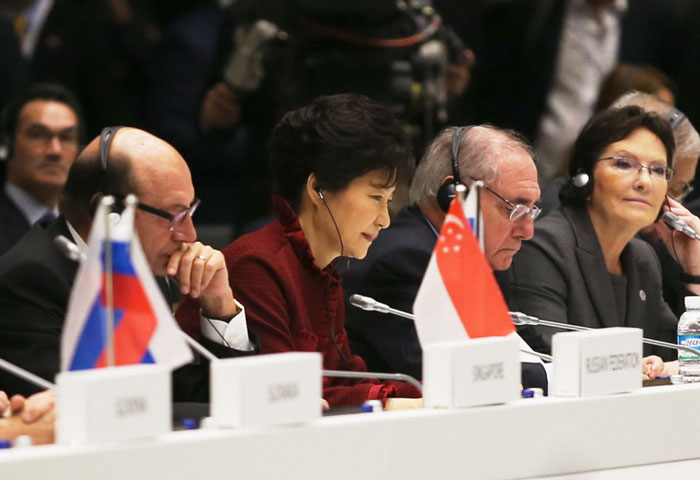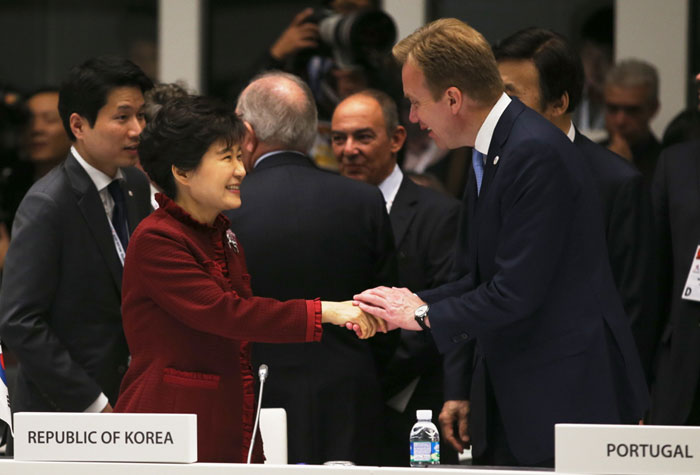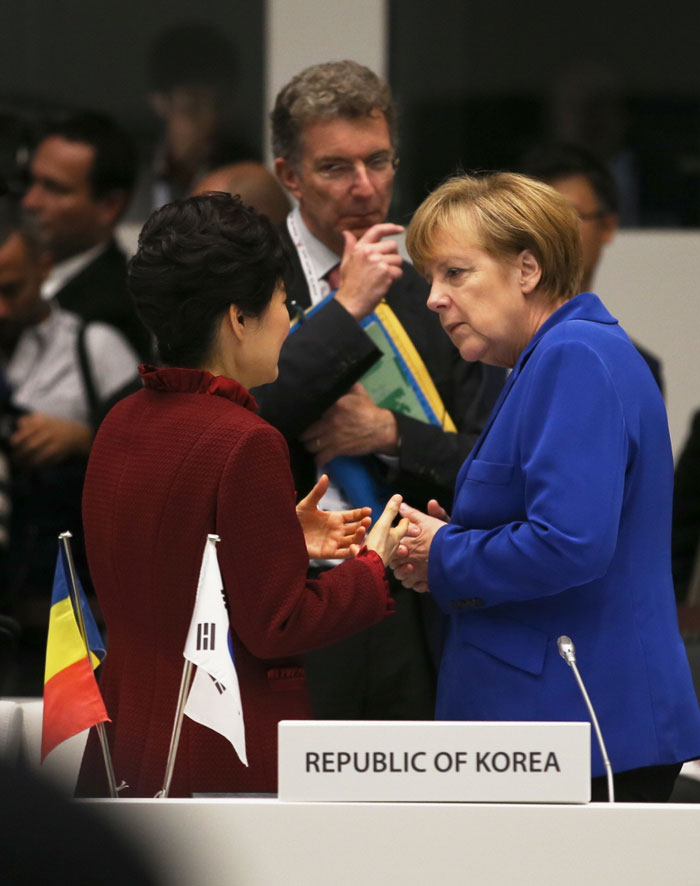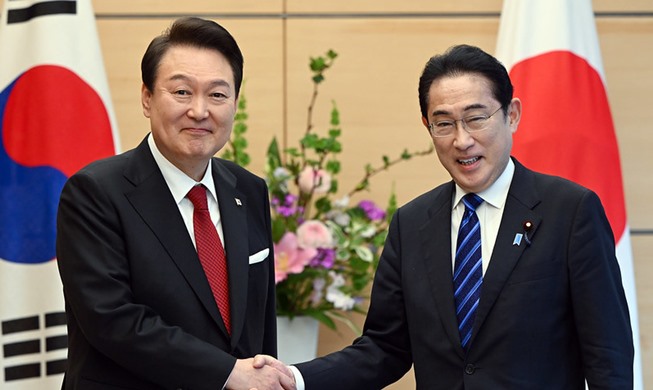-
 Korea.net's 24-hour YouTube channel
Korea.net's 24-hour YouTube channel- NEWS FOCUS
- ABOUT KOREA
- EVENTS
- RESOURCES
- GOVERNMENT
- ABOUT US
President Park Geun-hye said on October 16 that the Korean government will provide humanitarian support to the international community's efforts to tackle the Ebola epidemic. She said the government will also send medical staff to the affected area. The president also emphasized the need to bolster connectivity between Europe and Asia and proposed ways to boost trade across the Eurasian landmass.
박 During the tenth Asia-Europe Meeting (ASEM), held on October 15 and 16 in Milan, President Park addressed the second session and spoke about cooperation between Europe and Asia on solving global issues.
“Three weeks ago at the U.N. General Assembly, world leaders discussed ways to respond to global challenges, such as climate change, ISIS, poverty, development and the Ebola epidemic. We all agreed that such global issues cannot be solved by one nation or one area alone,” said the president.

“To better respond to the Ebola epidemic, Korea has provided humanitarian support and will dispatch medical staff to the disease-affected area. We will also host a high-level meeting of the Global Health Security Agenda (GHSA) next year,” she said.
In regard to Asia-Europe cooperation, Park said, “Asia and Europe have been actively cooperating in three areas: politics, economics and society & culture. However, cooperation is weak in some parts where we need to make more efforts.” To strengthen connectivity between the two continents, she proposed three measures: upgrading physical connectivity, establishing digitalized connectivity, and building more connectivity in culture and education.
“The Silk Road and sea routes that opened the Age of Exploration enabled the development of culture between the East and the West. In order to upgrade the physical connectivity between our two continents, we need to establish a comprehensive logistics network using railroads, roads, aviation, marine transport and the North Pole route, which will be open in the future,” said the president. She also proposed holding a symposium on a comprehensive logistics network across Eurasia where experts from Asia and Europe would gather to discuss ways to realize various logistics networks.
In regard to the establishment of digitalized connectivity, Park proposed to expand the Trans-Eurasia Information Network (TEIN), a project led by Korea, in order to share more information and knowledge and display creativity between research centers and education institutions across all of Asia and Europe.
Park said, “If both continents promote connectivity in the cultural sphere and in education, if we open our hearts and build trust, it will solidify the foundation for peace on earth,” emphasizing connectivity in the cultural sphere and in education.
The president said that the ultimate goal of the Korean government's Eurasia Initiative is to, “make Europe and Asia one continent, a continent of creativity and peace.”
“In order to connect the West and the East of Eurasia, we need to connect a missing part: North Korea. Asia and Europe need to make stronger efforts so that North Korea can open its closed doors and lead it down the path of true change.”


In regard to the Korean Peninsula, Park said, “Pyongyang needs to give up its nuclear weapons program and open its closed doors in order to make the lives of the North Korean people better and lead to the firm implantation of peace on the Korean Peninsula. A reunified Korean Peninsula would be a strong connecting link that completes the connectivity between Asia and Europe.“
“I used to dream of traveling from Busan, in the southern part of Korea, to Milan in Europe via North Korea and crossing the Eurasian land mass by train. If my dream could come true, connectivity between Asia and Europe would be finally be complete,” she said.
Meanwhile, the Korean government said it would finalize the details of dispatching medical staff to Ebola-affected regions in cooperation with related government organizations, such as the ministries of foreign affairs, national defense and health and welfare. Considering the urgency of the Ebola epidemic, the government said it would send medical experts to the region as soon as possible.
The government said it provided USD 600,000 through the WHO and UNICEF in the earlier stages of the Ebola crisis. It added that the government has been actively participating in the international community’s efforts to respond to the Ebola crisis by expressing its will to provide an additional USD 5 million at a recent high-level meeting on responding to Ebola at the U.N. General Assembly.
By Yoon Sojung
Korea.net Staff Writer
Photos: Cheong Wa Dae
arete@korea.kr

박 During the tenth Asia-Europe Meeting (ASEM), held on October 15 and 16 in Milan, President Park addressed the second session and spoke about cooperation between Europe and Asia on solving global issues.
“Three weeks ago at the U.N. General Assembly, world leaders discussed ways to respond to global challenges, such as climate change, ISIS, poverty, development and the Ebola epidemic. We all agreed that such global issues cannot be solved by one nation or one area alone,” said the president.

President Park Geun-hye (second from left) attends the opening ceremony of the tenth ASEM summit on October 16.
“To better respond to the Ebola epidemic, Korea has provided humanitarian support and will dispatch medical staff to the disease-affected area. We will also host a high-level meeting of the Global Health Security Agenda (GHSA) next year,” she said.
In regard to Asia-Europe cooperation, Park said, “Asia and Europe have been actively cooperating in three areas: politics, economics and society & culture. However, cooperation is weak in some parts where we need to make more efforts.” To strengthen connectivity between the two continents, she proposed three measures: upgrading physical connectivity, establishing digitalized connectivity, and building more connectivity in culture and education.
“The Silk Road and sea routes that opened the Age of Exploration enabled the development of culture between the East and the West. In order to upgrade the physical connectivity between our two continents, we need to establish a comprehensive logistics network using railroads, roads, aviation, marine transport and the North Pole route, which will be open in the future,” said the president. She also proposed holding a symposium on a comprehensive logistics network across Eurasia where experts from Asia and Europe would gather to discuss ways to realize various logistics networks.
In regard to the establishment of digitalized connectivity, Park proposed to expand the Trans-Eurasia Information Network (TEIN), a project led by Korea, in order to share more information and knowledge and display creativity between research centers and education institutions across all of Asia and Europe.
Park said, “If both continents promote connectivity in the cultural sphere and in education, if we open our hearts and build trust, it will solidify the foundation for peace on earth,” emphasizing connectivity in the cultural sphere and in education.
The president said that the ultimate goal of the Korean government's Eurasia Initiative is to, “make Europe and Asia one continent, a continent of creativity and peace.”
“In order to connect the West and the East of Eurasia, we need to connect a missing part: North Korea. Asia and Europe need to make stronger efforts so that North Korea can open its closed doors and lead it down the path of true change.”


President Park Geun-hye talks with world leaders at the opening ceremony of the tenth ASEM summit on October 16.
In regard to the Korean Peninsula, Park said, “Pyongyang needs to give up its nuclear weapons program and open its closed doors in order to make the lives of the North Korean people better and lead to the firm implantation of peace on the Korean Peninsula. A reunified Korean Peninsula would be a strong connecting link that completes the connectivity between Asia and Europe.“
“I used to dream of traveling from Busan, in the southern part of Korea, to Milan in Europe via North Korea and crossing the Eurasian land mass by train. If my dream could come true, connectivity between Asia and Europe would be finally be complete,” she said.
Meanwhile, the Korean government said it would finalize the details of dispatching medical staff to Ebola-affected regions in cooperation with related government organizations, such as the ministries of foreign affairs, national defense and health and welfare. Considering the urgency of the Ebola epidemic, the government said it would send medical experts to the region as soon as possible.
The government said it provided USD 600,000 through the WHO and UNICEF in the earlier stages of the Ebola crisis. It added that the government has been actively participating in the international community’s efforts to respond to the Ebola crisis by expressing its will to provide an additional USD 5 million at a recent high-level meeting on responding to Ebola at the U.N. General Assembly.
By Yoon Sojung
Korea.net Staff Writer
Photos: Cheong Wa Dae
arete@korea.kr
Most popular
- China warmly welcomes first Korea-born giant panda Fu Bao
- First hearing-impaired K-pop act hopes for 'barrier-free world'
- Gov't to transform sports sector into future growth engine
- Int'l writers give their takes on nation's 'festive' election culture
- Novelist Hwang's 'Mater 2-10' shortlisted for Int'l Booker Prize













